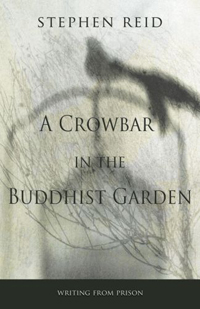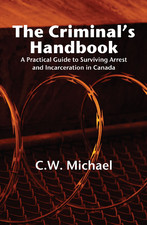Reviews
Nonfiction Review by Neil Boyd
Stephen Reid, A Crowbar in the Buddhist Garden: Writing from Prison (Saskatoon: Thistledown, 2012). Paperbound, 140 pp., $18.95.
C. W. Michael, The Criminal’s Handbook: A Practical Guide to Surviving Arrest and Incarceration in Canada (London: Insomniac, 2012). Paperbound, 342 pp., $19.95.
Stephen Reid appeared to be a poster boy for redemption. The acclaimed author of Jackrabbit Parole married the accomplished writer Susan Musgrave in Kent Institution in 1986, and was paroled the following year. For the next twelve years he seemed, at least to most of us, to be a devoted father and family man, committed to practising the ideals of restorative justice, inventing a new life for himself on Vancouver Island. As he notes in his new book, this all came crashing to the ground in 1999, when he resumed his affection for illicit drugs, quickly became addicted, ran up a huge tab for this excess, and returned to his former occupation of bank robber to pay for his indulgence. But this time the bank robbery did not have the calculated precision of the Stopwatch Gang of his youth. An armed robbery of a Royal Bank in Victoria was followed by a wild chase through city streets, with shots fired, and he was soon arrested, after finding his way into the apartment of an elderly couple. “I return to the living room and sit slumped with the knowledge that my life is over. The couple emerge from the bedroom and introduce themselves as John and Kathy, as if I were some kind of queer guest. Kathy fetches me water—I must have looked thirsty, and John, an old Serbian freedom fighter, rolls me a cigarette.”
Reid was sentenced to eighteen years in prison, and remains there today, with something close to five years to serve. A Crowbar in the Buddhist Garden is a nicely written book, thoughtful and without self pity, that tries to explain how and why Reid gave up what seemed to be a better life, to return to addiction, and to jail. He does not blame his childhood for what has happened to him, and he knows that he cannot pin these crimes on anyone but himself. “I plead out and although the judge listens to my junkie alibi he knows what everyone else, including me, knows—that we live in the arena of choices and now I’ll have to live with this one.”
It’s difficult to understand why Reid went back to a self-destructive track of injecting speedballs and committing bank robbery to pay the bills. He hints at some of the logic in describing an annual lunch of poets and writers: “Somewhere before dessert and after my third refusal of wine I began to distance from the comfortable humour of my friends. They were animated about their gardens, happy with their ex-partners, and self deprecating.…They were smart, sensitive, and sensible people. I saw in them, perhaps wrongly, a coherence, an essential wholeness that I lacked.”
Most of us like to alter consciousness, with red wine, coffee, chocolate, maybe even with cannabis, cocaine, or psychedelics. But what is it that would push the author to go so far beyond the simple pleasure of intoxication, to a self-destructive path of addiction, debt, and robbery? There are essays here that provide some insight—injecting before he became a teenager, followed by years lived in something close to a state of oblivion. Perhaps this is his lot in life—that he must always return to the abyss, in some shape or form. Musing on the decline of prison writing, Reid observes: “Rebuked by the public, prison authors have learned to write with shame, but not about it. Many choose to invert shame; most drown in it.” A Crowbar in the Buddhist Garden is a prison memoir of significance. As he writes, “Misfortune earned can become a profound privilege. To know absolute loss, to suffer real guilt, to look back on how you have betrayed most of what you thought of as decent and good—that is a stripped-down placed indeed.”
 Unlike Stephen Reid, C. W. Michael does not write about shame, except, perhaps, to invert it—to point to inept and greedy lawyers, corrupt and lying police officers, the lack of legal rights in prison and correctional programs that serve to work against possibilities for parole. In fairness, The Criminal’s Handbook is not a prison memoir, but a what-to-do book for those who might find themselves in similar circumstances. Certainly the author’s critique of imprisonment is sound. The punishment of prison has very negative impacts, and it remains an inappropriate place for many who find themselves within these institutions, damaged rather than improved by the experience. But there is a relatively unrestrained resentment that runs through this book, likely understandable, given the author’s experiences, and the reality that he began writing the book while in segregation for twenty-eight months. Unfortunately, however, some of his statements are a little simplistic. “Letting a lawyer know you have plenty of cash will often make them drool and calculate ways to get more from you later.…Lawyers work for profit—as much as they can grab. True, your case may take time to resolve, but even if your chances of winning are slight or zero, no lawyer will tell you that if money can be made.”
Unlike Stephen Reid, C. W. Michael does not write about shame, except, perhaps, to invert it—to point to inept and greedy lawyers, corrupt and lying police officers, the lack of legal rights in prison and correctional programs that serve to work against possibilities for parole. In fairness, The Criminal’s Handbook is not a prison memoir, but a what-to-do book for those who might find themselves in similar circumstances. Certainly the author’s critique of imprisonment is sound. The punishment of prison has very negative impacts, and it remains an inappropriate place for many who find themselves within these institutions, damaged rather than improved by the experience. But there is a relatively unrestrained resentment that runs through this book, likely understandable, given the author’s experiences, and the reality that he began writing the book while in segregation for twenty-eight months. Unfortunately, however, some of his statements are a little simplistic. “Letting a lawyer know you have plenty of cash will often make them drool and calculate ways to get more from you later.…Lawyers work for profit—as much as they can grab. True, your case may take time to resolve, but even if your chances of winning are slight or zero, no lawyer will tell you that if money can be made.”
This is not to say that The Criminal’s Handbook is without merit. As the book jacket notes, it is a practical guide to surviving arrest and incarceration in Canada. And for those who find themselves behind prison walls, it may well offer a much needed degree of comfort and understanding.
—Neil Boyd









